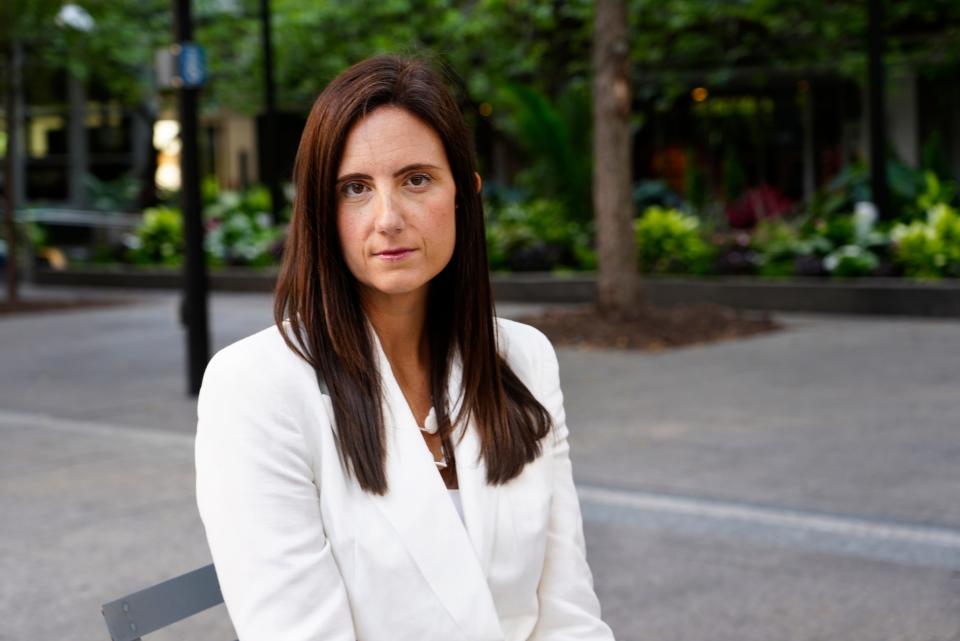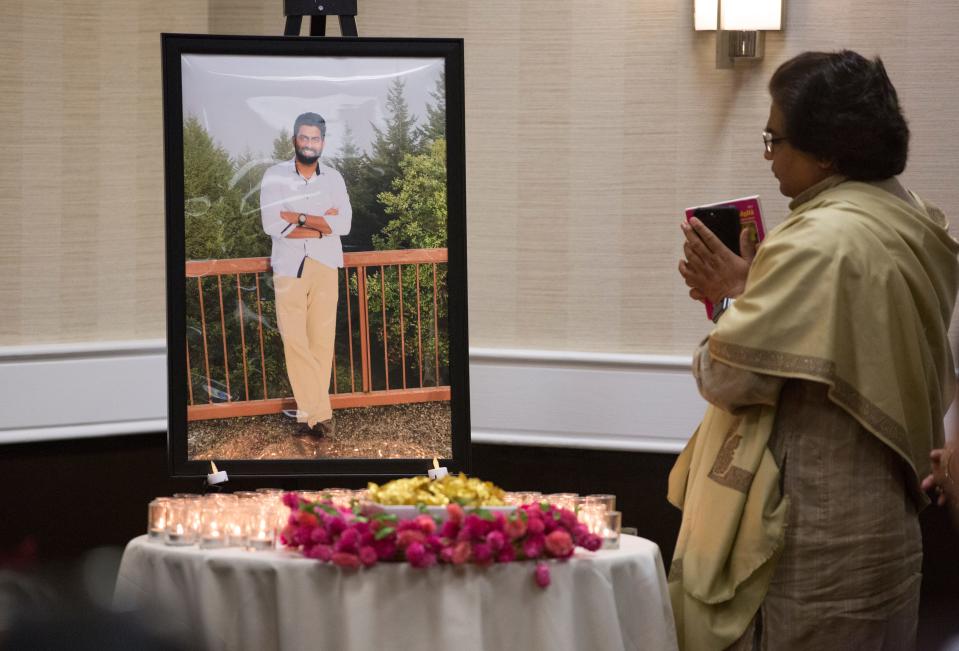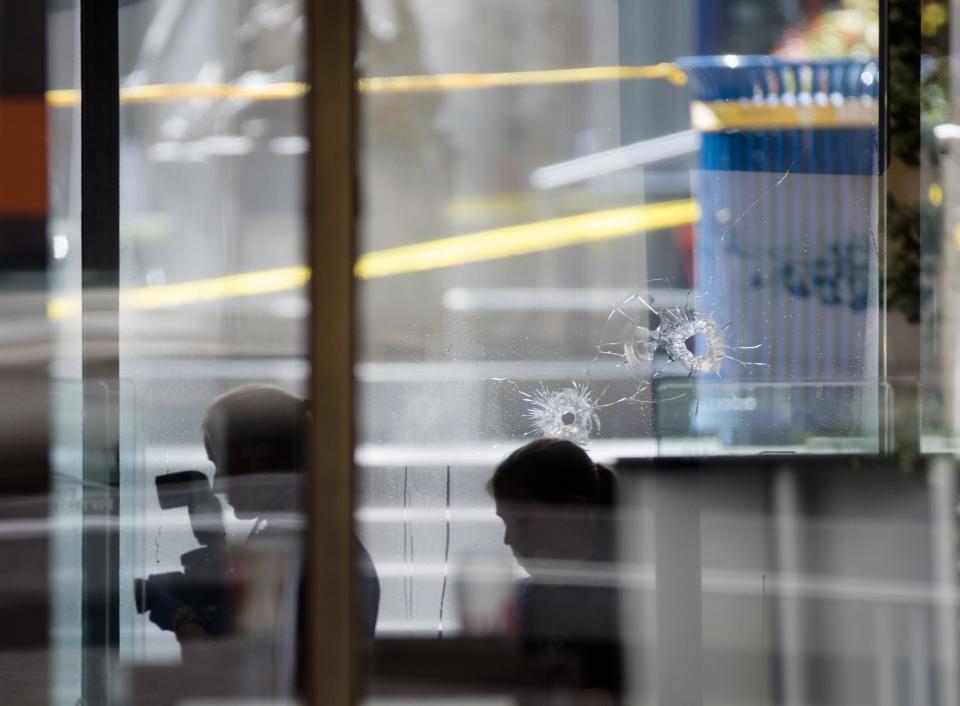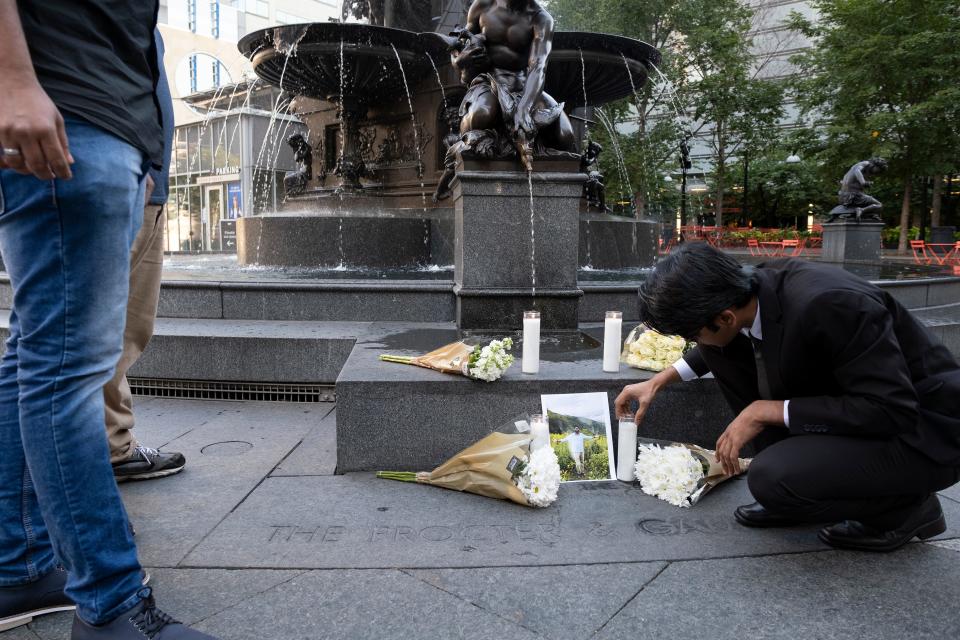5 years after Cincinnati's mass shooting, its Louisville victim still on 'high alert'
Sitting at a table in Fountain Square, the Tyler Davidson fixture gurgling beneath her words, Whitney Austin suddenly tensed and stopped talking.
A man on a cell phone walking nearby had veered close to her chair. A little too close. Austin’s body went rigid.
The stranger on a call didn’t seem to notice. If he’s reading this description, in fact, he likely doesn’t recognize himself in the scene. He was oblivious.
That’s a luxury Austin hasn’t had since Sept. 6, 2018, the morning she was shot 12 times as one of five gunshot victims – three of them fatal – in a mass shooting inside the Fifth Third Bank.
“I didn’t like that,” Austin, 42, said as her body relaxed after the man on the phone passed. “I’m definitely on high alert.”

That wasn’t the case the morning of the shooting. Five years ago, the Louisville woman had been on the phone herself, immersed in a conference call as she entered the lobby of the bank, for which she worked as an executive. Just after 9 a.m., a gunman opened fire, his bullets striking five people who, like Austin, had simply been minding their own business.
Austin and Brian Sarver, then a 45-year-old contractor, were the two who survived physical injuries. But Sarver is quick to say that plenty of others bear invisible scars left by the senseless attack.
"(The gunman) did fire at several other people, but he didn't hit them, luckily," said Sarver, now 50, who lost his spleen in aftermath of the shooting. "It definitely affected everyone who was in the lobby at that time."
And plenty who weren't. The news traumatized the city, sparked Cincinnati Strong hashtags on social media, spurred more than $1.2 million in donations for survivors and families of the slain, and inspired Austin to create a nonprofit organization aimed to thwart gun violence.
"People have been impacted for life," said Yashwanth Yeddulapalli, 32, whose friend Prudhvi Raj Kandepi, at age 25, was the youngest of the three killed victims.

Every year since the attack, some of Kandepi's friends − Yeddulapalli among them − have traveled to Cincinnati to mark the anniversary of their India-born friend's death.
"His family back home, it's still hard for them," Yeddaulpalli said. "They still can't process what happened. It's hard to swallow for any of the families − not just him, but for all the other families, too. It's disrupted their lives forever."
'I was the first bullet that day'
No matter how many years pass, elements of the 2018 shooting continue to flummox those affected by it. Austin, for one, remains dumbfounded that she sustained the most wounds and yet walked away with the least serious injuries. While Sarver was rushed straight to surgery to staunch the damage done by a gunshot wound to his left side, Austin’s first surgery could wait until morning.
“None of my major organs were hit. The whole thing’s a miracle to be shot 12 times. Nobody else gets shot 12 times and lives,” she said. “This is the way I say it: I got the very best of the worst.”

The three who, along with their families, endured “the worst of the worst” were: engineer Kandepi, who'd been shot in the head, torso and arms; construction supervisor Richard Newcomer, 64, killed by a single gunshot to his upper left back; and Luis Felipe Calderón, 48, a Colombia native killed by shots to his chest and back.
"I was the first bullet that day," Sarver said recently. "The first shot out of the gun was me."
Sarver had been standing in the bank lobby with two coworkers, one of whom was Newcomer, whom everyone called Rick. The bullet entered Sarver's lower back, striking his spleen before exiting through his abdomen.
"It spun me around to the right and there was an open stairwell that goes down into the basement," Sarver recalled. "I dove down the stairs. He continued to fire at me, but he of course missed me, thank God. I didn't get hit any more times after that."
Newcomer was shot next and followed Sarver down the stairs, where an employee-only entrance slowed their escape. Sarver's badge to open the door had fallen on the floor when he was shot, but Newcomer still had his. Bleeding heavily from the wound in his torso, Newcomer used his badge to open the door, Sarver said.
The injured men, who could still hear gunfire overhead in the lobby, made their way to a loading dock and waited for what seemed like an eternity for an ambulance. Newcomer was still conscious and talking when the first arrived to transport him to the hospital, where he died from his injuries. Sarver grapples daily with feeling grateful he survived and guilty that Newcomer didn't.
"The negativity is going to come and beat you down if you let it," he said. "You have to focus on being positive, focus on thinking about that thankfulness or that glass-is-half-full mentality.
"I'm not saying I do it well all the time. It's work."
'I don't look back with regret'
The gunman that day was 29-year-old Omar Enrique Santa Perez, who had fired 35 rounds from a 9 mm handgun in a span of 4 minutes, 28 seconds.
That was precisely how long it took Cincinnati police to arrive to the scene, having been dispatched after a bystander called 911 55 seconds after the first gunshot. The gunman was still actively firing when officers arrived and opened fire in return, felling him with a bullet to his back.
It took police a year to release a summary of its investigation into the shooting, which revealed that Santa Perez had learned the day before his rampage that a lawsuit he had filed against NBC Universal and TD Ameritrade had been dismissed a second time. The gunman had claimed the two companies had uncovered his identity and were publishing private details about his life – allegations that federal magistrate Karen Litkovitz had described as “rambling, difficult to decipher and (bordering) on delusional” when she dismissed the case.
The day before the shooting, Santa Perez had learned about the second dismissal from a lawyer representing NBC Universal, police announced in late September 2019. Surveillance video captured before the shooting showed Santa Perez walking toward Cincinnati’s federal courthouse, which was across the street from Fifth Third’s home on Fountain Square.
The footage depicted him crossing a skywalk over Walnut Street with a messenger bag slung over his shoulder and a drink from Panera Bread in his hand.
That's as close as police have come to ascribing a motive for the attack. Santa Perez had a long history of mental health issues, his family told police. They sought treatment for him in 2010 and 2012 in Florida, where they argued before Palm Beach County judges that Santa Perez was violent and mentally ill, prompting mental health evaluations.
It was that revelation – that the gunman had accessed a firearm despite his family’s repeated warnings that he was dangerous – that sparked Austin to create her nonprofit, Whitney/Strong, within months of the shooting. The organization primarily promotes safe firearm storage and resources for responsible gun ownership while pushing for bipartisan legislation that makes it tougher for people in mental crises or with violent histories to access firearms.
Austin, a married mother of two who routinely traveled from Louisville to the Fifth Third headquarters in Cincinnati, acknowledged that her decision to swiftly develop the organization was perhaps hasty, if well-intentioned.
“I think that I probably could have benefited from taking longer to start Whitney/Strong and concentrating on myself,” she said. “But at the same time, that was the moment in which people were active, and had I waited, Whitney/Strong might not exist today. So I don’t look back with regret.”
The organization aims this week to balance a few goals during its Week of Remembrance marking the fifth anniversary of the shooting: honoring the three men killed five years ago, providing resources to people wanting to learn how to predict and thwart gun violence and assuring those who worry the cycle of violence is destined to never end that there are reasons to feel optimistic.
"I'm mostly very hopeful because my ear is very close to the ground and I see change happening every day that people don't see," Austin said.
She cited two pieces of legislation as proof: Kentucky's proposed Crisis Aversion and Rights Retention bill, or CARR, sponsored by Sen. Whitney Westerfield, a Fruit Hill Republican, that aims to remove guns from people in crisis, as well as the federal Safer Communities Act, whose swath of bipartisan supporters included Sen. Mitch McConnell, a Louisville Republican. The latter act provides funding for mental health services and school security initiatives while also expanding criminal background checks for some gun buyers and making it tougher for domestic-violence offenders to buy guns.
"I've talked about bipartisan work from the very beginning, and I have to be honest: It didn't become real for me until the bipartisan Safer Communities Act" passed in 2022, Austin said. "No one will ever be able to take that example away from me."
'I'm going to keep doing this as long as I can'
Those marking this week's fifth anniversary of the shooting will do so in ways big and small, private and public.
Austin's organization has daily events, including a free program called "Save A Life: The Research Edition," during which criminologists will share warning signs of impending violence Tuesday, Sept. 5, at 6:30 p.m. On Wednesday, Whitney/Strong also will host Storytelling on the Square, which will feature a mural by local artists sharing stories of gun violence throughout Cincinnati.
Other gestures will be more subtle.
"I'm just going to be on my own," said Yeddulapalli, who is coming with his wife and a friend to do what he's done every year since the shooting: spend time visiting the tree he and friends planted for Kandepi at Spring Grove Cemetery, leave a photo and some flowers on Fountain Square and walk through the lobby door Kandepi had obliviously entered that fateful morning.
"It doesn't matter to me if it's been five years or 10 years," Yeddulapalli said. "I'm going to keep doing this as long as I can just to remember him and let him know that we didn't forget him."

This article originally appeared on Louisville Courier Journal: Fifth Third Bank survivors on 'high alert' 5 years after mass shooting

